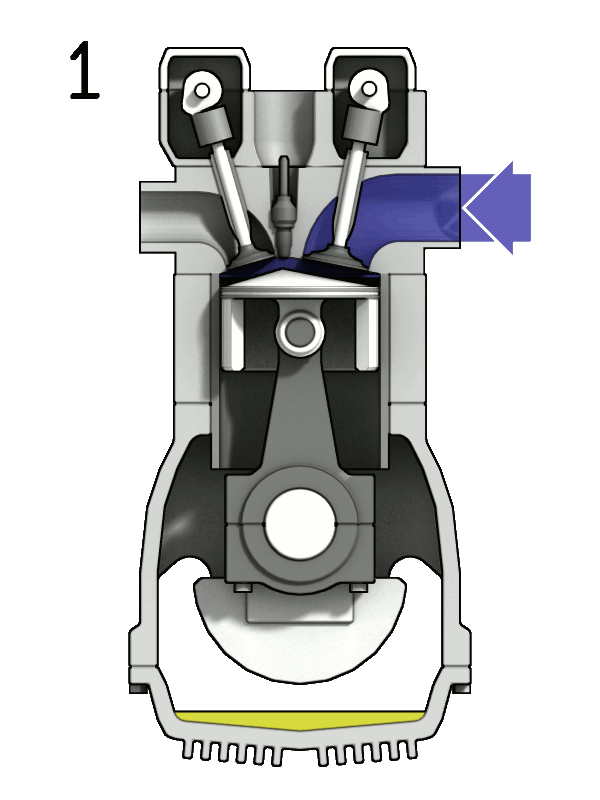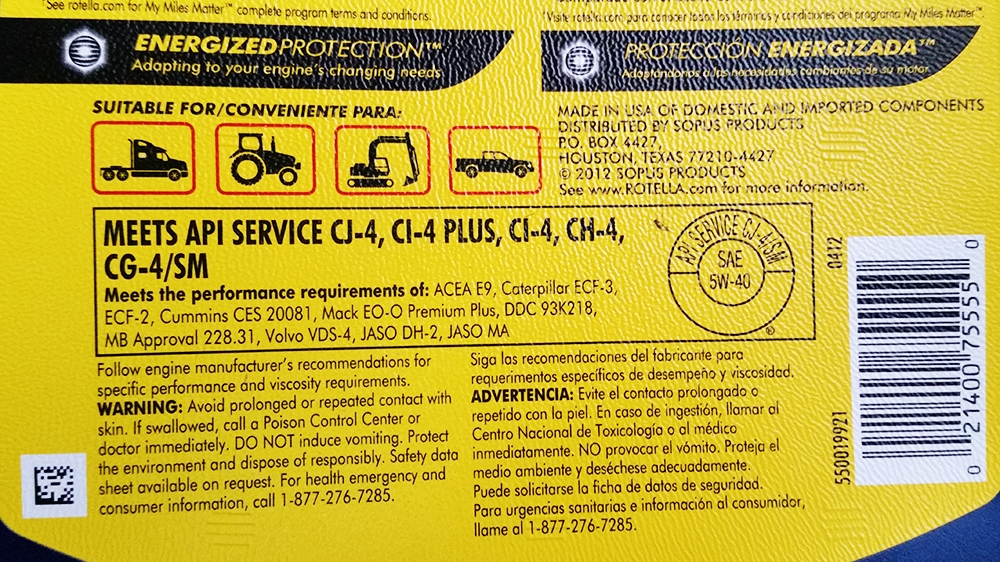Our FTC disclosure's magnum opus awaits here. The following article was last updated on Dec 1, 2022 ...
Bio-Synthetic Engine Oil: A Better Change!
Not everyone is comfortable with the idea of change, especially when it comes to their motorcycle and its engine oil. Faced with regularly scheduled maintenance, information new and old goes unread by many who trust the popular and reliable go-to that is 10W-40. Your visit to our corner of the web would suggest that you're at least interested in our basic exploration on the topic.
“Current science suggests the case for using full synthetic engine oil such as Rotella T6 5w40 or biodegradable G-Oil in your motorcycle is well justified.”
Personally, I started out using Rotella T 15W-40 motor oil. The gold standard in "dinosaur" oil (a finite natural resource), my dedication to this diesel-designated product was driven by outside influence and multiple educated opinions. One of those opinions suggested that the non-uniform molecular weight distribution of dino oil makes it a better choice for older bikes with suspect gaskets, their random perforations being an offending factor.
Times change and with new science on the horizon, the case for using full synthetic oil such as Rotella T6 5W-40 or biodegradable G-Oil is well justified. A bit of data collection and comparative research introduces real world benefits that are difficult to ignore. I, who once bowed to the 15W-40 engine oil gods am a full synthetic believer where motorcycling is concerned.
Full Synthetic Motor Oil Viscosity
Picture the moving parts inside of a running four-cycle engine. Gas is drawn, compressed, exploded and finally expelled as the pistons cycle up and down. What role does engine oil play?
“Here's a hint: it's more than just lubrication.”
While a motorcycle's manual-specified oil volume runs its course, one of its greatest and most effective roles is often taken for granted. Simply put, motor oil stops an engine's moving parts from coming into contact with one another. Where metal would otherwise meet metal, oil cushions the blow, filling any and all gaps while diverting motion toward the path of least resistance.
Multigrade viscosity ratings are key to understanding any engine oil's behavior while the above is in play. Many aren't familiar with motor oil viscosity labels, so as a quick reference: the "w" stands for winter. The number before the "w" specifies its maximum flow during a cold (or frozen) start. The number after it is just the opposite, namely viscosity at a fully warm operational temperature.
With my newly preferred 5W-40 G-Oil, I can safely assume that my motorcycle will start with greater ease during a northern winter, operating smoothly once warm.
Full Synthetic Engine Oil's Purpose
The use of full synthetic oil as an internal combustion engine lubricant has seen some argument. Concerns over its robust texture, compatibility with fuel injectors and catalytic converters are rendered null as no known problems exist. Each of these components are fuel system specific and have little if anything to do with oil flow.
Further developing the positives, G-Oil is a fully biodegradable alternative. Substituting animal fat for petrolium, this green-minded replacement has found its official place among the most trying racing professionals at Le Mans. A homegrown oil built on a natural response to patented nanotech, its formulation insures outstanding lubrication even under the most stringent conditions.
That's right, I said nanotech. Their patented "nano geodesic bearings" are tiny spherical shaped particles that are postulated to spin at unimaginably high speeds in support of adjacent oil molecules. This equates to noticeably more horsepower. The geeks get it. To push green tech, you must push performance and in the case of G-Oil it's a BIG win-win.
Full Synthetic Motor Oil's Chemical Makeup
With all of the petrol additives being peddled at gas stations and overblown sub-emblems scatter bombed across oil containers, it's hard to tell exactly which "enhancing" additives are legitimately useful versus mere filler. This is an area of consumerism that's better left to Google. Forums everywhere are ripe with experiences both positive and negative, with plenty of remaining space for sometimes heated debate.
The reduction of ZDDP (zinc dialkyldithiophosphate) in API-SM rated engine oils, for example caused a bit of a fuss among car enthusiasts. A mandate in the United States insisted that catalytic converters last for at least 120,000 miles and phosphorous has quite the damaging effect. While the change in concentration is minimal, it's still change (and we know how riders respond to that).
Rotella T6 full synthetic motor oil, on the other hand is diesel specific. Its additive ingredients intend to mirror the behavior of dino oil but because its chemical structure is synthesized so purely (like most full synthetic engine oil), a beneficial chain reaction ensues. We're talkin' self-sanitizing efficiency and responsiveness.
The low-ash additives in Rotella T6 5W-40 respond to different riding circumstances on-the-fly (cool cruising versus cookin' twisties) while minimizing wear and tear. Its heavy duty uses exceed that of any competitor in that it has a bizarre (non-corrosive) tendency to clean an engine's interior as it lubricates. Synthetic motor oil also slightly increases fuel economy as it allows fuel to burn more efficiently, though such information presents itself in mere nickels/dimes.
Full Synthetic Engine Oil Specifications
Any good brand of motorcycle-friendly motor oil will provide clear information regarding its rating, uses and disclaimers on the back of the bottle. Rotella T6 meets API service CJ-4, CI-4 plus, CI-4, CH-4 and CG-4/SM. These are the absolutely beastly performance requirements demanded by ACEA E9, Caterpillar ECF-3, ECF-2, Cummins CES 20081, Mack EO-O Premium Plus, DDC 93K218, MB Approval 228.31, Volvo VDS-4, JASO DH-2 and JASO MA.
Tha' heck is all that, you ask? It amounts to going above and beyond the current standards in modern machinery's operational efficiency, all while reducing chemical hazards and particulate matter as a sidebar. In short, the fully synthetic engine oil I'm currently using in my motorcycle (Rotella T6 as of this post, soon to be swapped out for the newly popularized G-Oil) could prospectively lubricate the moving parts in this monster.
As for my would-be slanted preference for what is a USDA certified, bio-based product, the DYNO data on the G-Oil website suggests their G1 racing oil to be the best of the bunch. PME testing proves an increase in horsepower even under serious whoopin', with less wear on the engine core.
Conclusions On Using Full Synthetic Motor Oil With Motorcycles
Behaving better at both cold and operating temperatures, full synthetic engine oils including G-Oil, Rotella T6 and even Amsoil have truly revolutionized the form. Where other nondescript brands over promote useless additive fillers, our preferred "big three" continue to pioneer for the better. Cleaning your engine's interior while promoting better fuel efficiency via a low-ash chemical formula may not be the sexiest pickup line, but ...
Regardless of what was used for your motorcycle's previous oil change, the science says that full synthetic motor oil is the way to go. Gone are the days of dino-drilled lubricants. Synthetic engine oil is more efficient, durable and long lasting when compared against the competition.
What's more, if you spend the extra coin for G-oil, all of the above gets expanded two-fold in a gift-wrapped package that's biodegradable!

Do You (Or Have You Ever) Used Bio-Synthetic Motor Oil With Your Motorcycle?
With so many full synthetic brands on the market, it can be difficult to choose a favorite. Which ones have you tried? What do you like about them and why? Your input is invited. Leave a comment and/or write an article!






Comments
Rotella T6 is a fully synthetic diesel oil. Consult your make/model specific forums and manufacturer's information to confirm that it is in fact safe for use with your motorcycle.
Thoughts gone wild? Write an article!